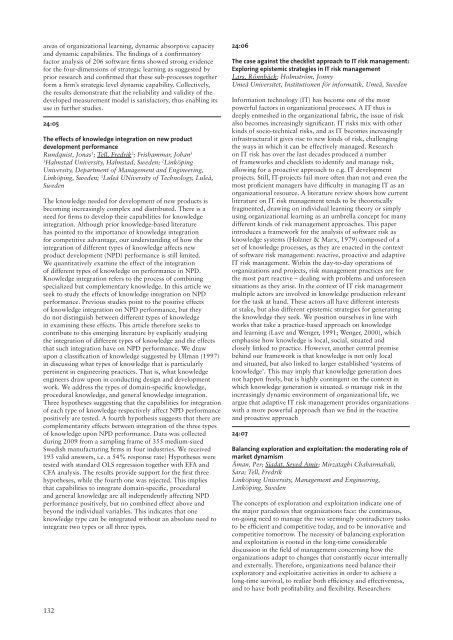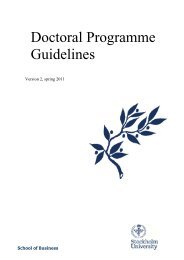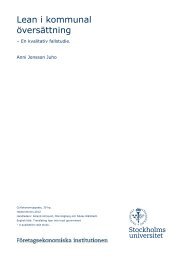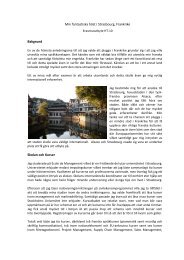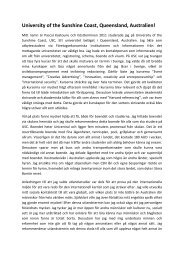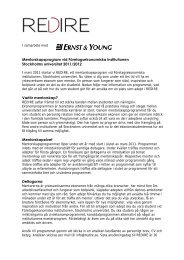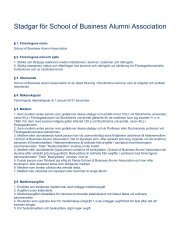Download full programme and abstract book pdf 1.6
Download full programme and abstract book pdf 1.6
Download full programme and abstract book pdf 1.6
You also want an ePaper? Increase the reach of your titles
YUMPU automatically turns print PDFs into web optimized ePapers that Google loves.
areas of organizational learning, dynamic absorptive capacity<br />
<strong>and</strong> dynamic capabilities. The findings of a confirmatory<br />
factor analysis of 206 software firms showed strong evidence<br />
for the four-dimensions of strategic learning as suggested by<br />
prior research <strong>and</strong> confirmed that these sub-processes together<br />
form a firm’s strategic level dynamic capability. Collectively,<br />
the results demonstrate that the reliability <strong>and</strong> validity of the<br />
developed measurement model is satisfactory, thus enabling its<br />
use in further studies.<br />
24:05<br />
The effects of knowledge integration on new product<br />
development performance<br />
Rundquist, Jonas 1 ; Tell, Fredrik 2 ; Frishammar, Johan 3<br />
1 Halmstad University, Halmstad, Sweden; 2 Linköping<br />
University, Department of Management <strong>and</strong> Engineering,<br />
Linköping, Sweden; 3 Luleå UNiversity of Technology, Luleå,<br />
Sweden<br />
The knowledge needed for development of new products is<br />
becoming increasingly complex <strong>and</strong> distributed. There is a<br />
need for firms to develop their capabilities for knowledge<br />
integration. Although prior knowledge-based literature<br />
has pointed to the importance of knowledge integration<br />
for competitive advantage, our underst<strong>and</strong>ing of how the<br />
integration of different types of knowledge affects new<br />
product development (NPD) performance is still limited.<br />
We quantitatively examine the effect of the integration<br />
of different types of knowledge on performance in NPD.<br />
Knowledge integration refers to the process of combining<br />
specialized but complementary knowledge. In this article we<br />
seek to study the effects of knowledge integration on NPD<br />
performance. Previous studies point to the positive effects<br />
of knowledge integration on NPD performance, but they<br />
do not distinguish between different types of knowledge<br />
in examining these effects. This article therefore seeks to<br />
contribute to this emerging literature by explicitly studying<br />
the integration of different types of knowledge <strong>and</strong> the effects<br />
that such integration have on NPD performance. We draw<br />
upon a classification of knowledge suggested by Ullman (1997)<br />
in discussing what types of knowledge that is particularly<br />
pertinent in engineering practices. That is, what knowledge<br />
engineers draw upon in conducting design <strong>and</strong> development<br />
work. We address the types of domain-specific knowledge,<br />
procedural knowledge, <strong>and</strong> general knowledge integration.<br />
Three hypotheses suggesting that the capabilities for integration<br />
of each type of knowledge respectively affect NPD performance<br />
positively are tested. A fourth hypothesis suggests that there are<br />
complementarity effects between integration of the three types<br />
of knowledge upon NPD performance. Data was collected<br />
during 2009 from a sampling frame of 355 medium-sized<br />
Swedish manufacturing firms in four industries. We received<br />
193 valid answers, i.e. a 54% response rate) Hypotheses were<br />
tested with st<strong>and</strong>ard OLS regression together with EFA <strong>and</strong><br />
CFA analysis. The results provide support for the first three<br />
hypotheses, while the fourth one was rejected. This implies<br />
that capabilities to integrate domain-specific, procedural<br />
<strong>and</strong> general knowledge are all independently affecting NPD<br />
performance positively, but no combined effect above <strong>and</strong><br />
beyond the individual variables. This indicates that one<br />
knowledge type can be integrated without an absolute need to<br />
integrate two types or all three types.<br />
132<br />
24:06<br />
The case against the checklist approach to IT risk management:<br />
Exploring epistemic strategies in IT risk management<br />
Lars, Rönnbäck; Holmström, Jonny<br />
Umeå Universitet, Institutionen för informatik, Umeå, Sweden<br />
Information technology (IT) has become one of the most<br />
powerful factors in organizational processes. A IT thus is<br />
deeply enmeshed in the organizational fabric, the issue of risk<br />
also becomes increasingly significant. IT risks mix with other<br />
kinds of socio-technical risks, <strong>and</strong> as IT becomes increasingly<br />
infrastructural it gives rise to new kinds of risk, challenging<br />
the ways in which it can be effectively managed. Research<br />
on IT risk has over the last decades produced a number<br />
of frameworks <strong>and</strong> checklists to identify <strong>and</strong> manage risk,<br />
allowing for a proactive approach to e.g. IT development<br />
projects. Still, IT-projects fail more often than not <strong>and</strong> even the<br />
most proficient managers have difficulty in managing IT as an<br />
organizational resource. A literature review shows how current<br />
literature on IT risk management tends to be theoretically<br />
fragmented, drawing on individual learning theory or simply<br />
using organizational learning as an umbrella concept for many<br />
different kinds of risk management approaches. This paper<br />
introduces a framework for the analysis of software risk as<br />
knowledge systems (Holzner & Marx, 1979) composed of a<br />
set of knowledge processes, as they are enacted in the context<br />
of software risk management: reactive, proactive <strong>and</strong> adaptive<br />
IT risk management. Within the day-to-day operations of<br />
organizations <strong>and</strong> projects, risk management practices are for<br />
the most part reactive – dealing with problems <strong>and</strong> unforeseen<br />
situations as they arise. In the context of IT risk management<br />
multiple actors are involved in knowledge production relevant<br />
for the task at h<strong>and</strong>. These actors all have different interests<br />
at stake, but also different epistemic strategies for generating<br />
the knowledge they seek. We position ourselves in line with<br />
works that take a practice-based approach on knowledge<br />
<strong>and</strong> learning (Lave <strong>and</strong> Wenger, 1991; Wenger, 2000), which<br />
emphasise how knowledge is local, social, situated <strong>and</strong><br />
closely linked to practice. However, another central premise<br />
behind our framework is that knowledge is not only local<br />
<strong>and</strong> situated, but also linked to larger established ‘systems of<br />
knowledge’. This may imply that knowledge generation does<br />
not happen freely, but is highly contingent on the context in<br />
which knowledge generation is situated. o manage risk in the<br />
increasingly dynamic environment of organizational life, we<br />
argue that adaptive IT risk management provides organizations<br />
with a more powerful approach than we find in the reactive<br />
<strong>and</strong> proactive approach<br />
24:07<br />
Balancing exploration <strong>and</strong> exploitation: the moderating role of<br />
market dynamism<br />
Åman, Per; Siadat, Seyed Amir; Mirzataghi Chaharmahali,<br />
Sara; Tell, Fredrik<br />
Linköping University, Management <strong>and</strong> Engineering,<br />
Linköping, Sweden<br />
The concepts of exploration <strong>and</strong> exploitation indicate one of<br />
the major paradoxes that organizations face: the continuous,<br />
on-going need to manage the two seemingly contradictory tasks<br />
to be efficient <strong>and</strong> competitive today, <strong>and</strong> to be innovative <strong>and</strong><br />
competitive tomorrow. The necessity of balancing exploration<br />
<strong>and</strong> exploitation is rooted in the long-time considerable<br />
discussion in the field of management concerning how the<br />
organizations adapt to changes that constantly occur internally<br />
<strong>and</strong> externally. Therefore, organizations need balance their<br />
exploratory <strong>and</strong> exploitative activities in order to achieve a<br />
long-time survival, to realize both efficiency <strong>and</strong> effectiveness,<br />
<strong>and</strong> to have both profitability <strong>and</strong> flexibility. Researchers


